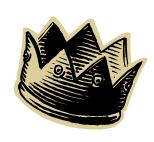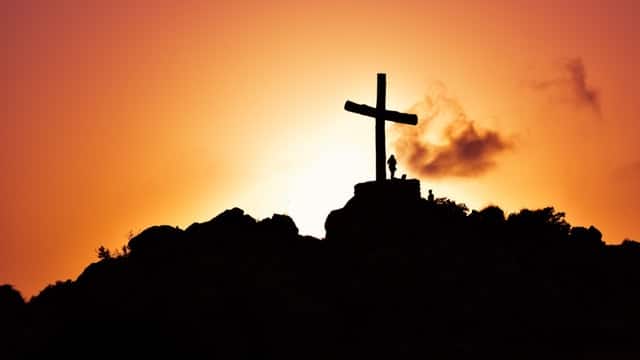Zechariah 3:1-9
As we approach this season, we will once again hear the story of Christ and of Christmas. We will exchange the traditional greetings of “Merry Christmas!” “Happy New Year!” We will speak of joy, hope and peace.
But we must ask, “Is this real?” Is there really any hope of joy and peace in this dark, depraved world?
Politicians and media personalities are dropping like flies in spiraling scandals. A wicked national leader is threatening us all with his new rocket weapons. The nations do not trust each other and tensions are beginning to rise. So let’s be real. Is there any real hope of peace and joy as we approach the Christmas season and the New Year?
The Scriptures tell us that there is such hope. Romans 15:12-13 declares “. . .There shall be a root of Jesse, and He that shall rise to reign over the Gentiles; in him shall the Gentiles trust. Now the God of hope fill you with all joy and peace in believing, that ye may abound in hope, through the power of the Holy Ghost.”
Consider “The Root of Jesse” (a quote from Isaiah 11). It is He who shall rise to rule the nations, and the nations will trust Him. And here is the real reason for wishing others well in this season. Through this “Root of Jesse,” “the God of hope” will “fill you with all joy and peace . . .” through the Holy Spirit.
The Root of Jesse gives us perfect meaning, for He is the perfect mediator, the perfect majesty and the perfect messenger.
If the God of hope has given you a leader who can guide you into joy and peace, would you want his help? If such an adviser is available to you, wouldn’t you want to take full advantage of his guidance? Consider the blessings of the Branch, the Root of Jesse.
Let’s turn to the Old Testament Book of Zechariah and chapter 3. And as we turn, let’s consider the broad message of the Bible, the Book of books. What is the Bible all about? In this coming New Year, when you read through your Bible, it would be good to keep the overall message in mind. What is it?
The first five Books of the Bible: In Genesis through Deuteronomy, we learn about the Law given by God. From the earliest pages, they emphasize the need for a sacrificial covering for sin. One entire book was written to show the priests, the Levites, how to offer up sacrifices: the Book of Leviticus. Yet as you read these first five books, you walk away longing for the perfect sacrifice, and the perfect priest, the perfect mediator.
The next twelve Books of the Bible: In Joshua through Esther, we learns to look for something else. Joshua (whose name means, “Jehovah is salvation”) emerges to lead his people into the Promised Land. But Joshua died, and in the Book of Judges, one leader after another died, and the people rebelled. And all the while, through 1 and 2 Samuel, 1 and 2 Kings, 1 and 2 Chronicles (of the Kings), the people were looking for the flawless king, the perfect majesty.
In the 5 Wisdom Books, you find personal reflections on all that has gone on before. What do all those Laws and sacrifices mean? These books lead us to give our hearts to the Lord in order to understand. Unless we come to the Lord with open hearts, we will never embrace His gift of the Savior. These books, which so many of you love so well, cause you to look for perfect meaning – in an ultimate sense. What do we mean by the phrase, “in an ultimate sense?”
Consider the words of Psalm 40:6-8: “6 Sacrifice and offering thou didst not desire; mine ears hast thou opened: burnt offering and sin offering hast thou not required. 7 Then said I, Lo, I come: in the volume of the book it is written of me, 8 I delight to do thy will, O my God: yea, thy law is within my heart.” How could any Old Testament believer write the words, “burnt offering and sin offering has Thou not required?!”
It’s because these Laws and sacrifices were ultimately pointing to the Savior and Lord – the Redeemer of Israel (see Hebrews 10:5-7). So using Psalm 119:15, we look into the Word of God to learn the ways of God – longing for perfect meaning.

So, what do we learn from the Old Testament Scriptures? They help us to look for, and long for, the perfect Prophet, Priest and King. Only this Messenger (Prophet), this Mediator (Priest), can lead us to true meaning in life, for He is the Majesty (King) sent from God. As we come near the end of the Old Testament, we come with the longing for the prophecy of the Priest who will be crowned as King. Now consider the words of Zechariah 3:1-9 and 6:11-12.
1 And he shewed me Joshua the high priest standing before the angel of the LORD, and Satan standing at his right hand to resist him. 2 And the LORD said unto Satan, The LORD rebuke thee, O Satan; even the LORD that hath chosen Jerusalem rebuke thee: is not this a brand plucked out of the fire? 3 Now Joshua was clothed with filthy garments, and stood before the angel. 4 And he answered and spake unto those that stood before him, saying, Take away the filthy garments from him. And unto him he said, Behold, I have caused thine iniquity to pass from thee, and I will clothe thee with change of raiment. 5 And I said, Let them set a fair mitre upon his head. So they set a fair mitre upon his head, and clothed him with garments. And the angel of the LORD stood by. 6 And the angel of the LORD protested unto Joshua, saying, 7 Thus saith the LORD of hosts; If thou wilt walk in my ways, and if thou wilt keep my charge, then thou shalt also judge my house, and shalt also keep my courts, and I will give thee places to walk among these that stand by. 8 Hear now, O Joshua the high priest, thou, and thy fellows that sit before thee: for they are men wondered at: for, behold, I will bring forth my servant the BRANCH. 9 For behold the stone that I have laid before Joshua; upon one stone shall be seven eyes: behold, I will engrave the graving thereof, saith the LORD of hosts, and I will remove the iniquity of that land in one day. 10 In that day, saith the LORD of hosts, shall ye call every man his neighbor under the vine and under the fig tree.
The Lord caused his iniquity to be put away (v. 4), and he was clothed with new garments (v. 4-5). (This is beautiful picture of the doctrine of justification: the sinner is forgiven and declared to be righteous, standing with priestly robes of righteousness before God.)
In verses 6-7, Joshua is encouraged to trust God’s promises and walk in them.
As a result, verse 8 calls Joshua and his fellow leaders a “sign,” or a “wonder.” And you and I must wonder – how can these things be? How could this remarkable transformation take place? Here is God’s answer in verse 8: “behold, I will bring forth my servant the BRANCH.” Here is a prophecy of the great high Priest (Hebrews 4:14-16) whom God would send.
Through the blessings of the Branch, God would take away the sin of His people and cause them to stand before Him righteous and justified in His sight. “The future blessings the priests embody find fulfillment in the one the Lord calls “my servant,” who is also “the Branch” (?ema?). “Branch” is one of the Old Testament’s most prominent messianic titles, . . .”[i]
The Wonderful Counselor (Isaiah 9:6-7) would cause these forgiven, righteous men to be “wonders” indeed. But Zechariah has yet more to tell us about the blessings of “the Branch.”
Turn forward to Zechariah 6:11-12. “Then take silver and gold, and make crowns, and set them upon the head of Joshua the son of Josedech, the high priest; 12 And speak unto him, saying, Thus speaketh the LORD of hosts, saying, Behold the man whose name is The BRANCH; and he shall grow up out of his place, and he shall build the temple of the LORD:”
In Zechariah 6:11-12, the priest was crowned as royalty. Throughout the Old Testament, the office of king and priest were kept completely separate by law. When King Saul acted as a priest (in 1 Samuel 13:9-14), the kingdom was taken from him.
Yet here in Zechariah 6, the priest is crowned as a royal king. Joshua was not “the Branch” but was a picture of “the Branch” who would come” “12 And speak unto him, saying, Thus speaketh the LORD of hosts, saying, Behold the man whose name is The BRANCH; and he shall grow up out of his place, and he shall build the temple of the LORD:”
And we know the glory of the Branch. We enjoy the blessings of the Branch. We know “the Root of Jesse” who is our Prophet, Priest and King.
And in this holiday season, we rejoice that this is not “make-believe” or myth. We know our Messiah, the Lord Jesus Christ, the perfect Priest who offered Himself as the perfect sacrifice for our sins on the cross. We know Him as that “Prophet” (Deuteronomy 18:18) who is our majestic King of kings and Lord of lords.
Could it be any worse for a high priest – a “go between” or mediator between God and men?
In violation of God’s Law (v. 3), he was clothed in filthy garments. This is picture of every sinner – clothed in the filthy rags of self-righteousness (Isaiah 64:6). Satan stood at his right hand to accuse him (v.1). Who will come to his rescue? Who and what will fill him with all joy and peace in this awful state?
In this vision, Joshua was transformed, like brand plucked from the burning (v. 2).

Applications
- Do you sense that you stand before God in the filthy robes of self-righteousness? Take heart in the blessings of the Branch. Through faith in His sacrificial work, God forgave these men and clothed them with righteousness. Stand before the Lord in the power of the Branch.
- Do you long for a Guide to help you live life? The Branch is your leader and shepherd. Trust the promises that God has given to you through Him.
- Read your Bible all the way through in this coming year. Look for real meaning, as you search the Scriptures to find the perfect Messenger (Prophet), the perfect Mediator (Priest) and the perfect Majesty (King): Jesus Christ (John 5:39).
- In this holiday season, trust the Lord to “fill you with all joy and peace in believing” through the Root of Jesse, our blessed Redeemer.
- Then face your fears about politicians, famous personalities, and wicked dictators by trusting in the Branch, your blessed Redeemer.
Pastor Gordon Dickson, Calvary Baptist Church, Findlay, Ohio
[i] [i] George L. Klein, Zechariah, vol. 21B, The New American Commentary (Nashville, TN: B & H Publishing Group, 2008), 143.

